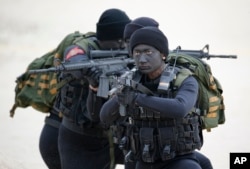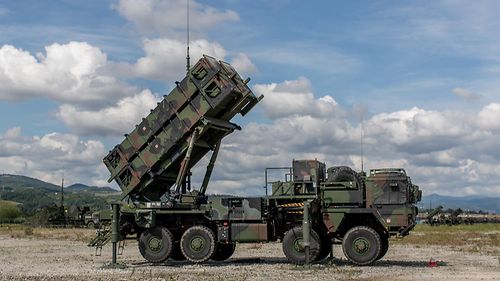ScreamingEagle
Gold Member
- Jul 5, 2004
- 13,399
- 1,707
- 245
Beijing warns of invasion if Taiwan dares to declare its independence
March 9, 2005
CHINA increased regional tensions yesterday when the annual parliament in Beijing tabled an anti-secessionist Bill that explicitly threatens the invasion of Taiwan if the island declares independence.
Any such move by Taiwan will trigger “non-peaceful means and other necessary measures to protect China’s sovereignty and territorial integrity”, Wang Zhaoguo, a senior legislator, told the National People’s Congress.
The move prompted a furious reaction in Taiwan. “(China) has issued a blank cheque to its military for the use of force against Taiwan,” Chiu Tai-shan, vice-chairman of the policy-making Mainland Affairs Council, said.
While the Bill does not specify which actions may provoke a Chinese invasion, it is seen as a strong display of sabre-rattling. However, Mr Wang, apparently eager to nurture improving relations with the United States, emphasised that peaceful reunification was Beijing’s goal.
President Bush has vowed to protect Taiwan against attack and Washington has watched the passage of the Bill with growing concern.
In another move, Beijing suggested that Australia review its Anzus alliance with the US, under which it could agree to support American action in defence of Taiwan. Alexander Downer, the Australian Foreign Minister, said that there were no plans to modify the alliance.
Mr Wang, who sits on the Communist Party’s 24-member Politburo, told the 3,000 delegates in the Great Hall of the People: “So long as there is a glimmer of hope for peaceful reunification, we will exert our utmost to make it happen rather than give it up. Using non-peaceful means would be our last resort.” In an effort to soothe American concerns, he emphasised that peaceful reunification remained Beijing’s ultimate goal.
China’s Communist Government has always considered invasion an option when it comes to Taiwan, which is a painful thorn in the side of the surging “New China”. Resolving the Taiwan issue is considered one of the “three historic tasks of the Communist Party of China and the country”.
The legislation will sail through the largely ceremonial parliament when voting takes place on Monday, at the end of the ten-day session, which also will approve a big increase in China’s military budget.
Analysts said that “non-peaceful” was a flexible term that could allow for sanctions and blockades, rather than invasion, to force the issue. Diplomats said that there was not a timetable for the law and noted that Wen Jiabao, the Chinese Prime Minister, had emphasised peaceful means to resolve the matter during his address last Saturday.
Beijing has claimed sovereignty over Taiwan since 1949, when the Nationalists retreated to the island as the Communists swept to power.
In Taiwan, President Chen Shui-bian has called the legislation the biggest threat to regional stability. Frank Hsieh, the Prime Minister, said that he supported revising sensitive parts of the Constitution if China legalises the attacking of Taiwan and the inclusion of the island as part of the People’s Republic of China.
Thousands in Taiwan have demonstrated against the Bill. One protester carried a banner that read “No Anschluss”, a reference to the annexation of Austria by the Nazis in 1938.
Dialogue between the old enemies stalled in 1999 and Beijing has pushed Taipei into diplomatic isolation. However, China is Taiwan’s largest trading partner and the island has huge holdings on the mainland, having invested about £44 billion there in the past ten years. About one million Taiwanese live in China.
Arms have proliferated on both sides of the Taiwan Strait in recent years. Beijing has spent huge amounts of money to fortify the 2.5-million-strong People’s Liberation Army and aim rockets across the 100-mile-wide stretch of water that divides the rivals.
http://www.timesonline.co.uk/article/0,,3-1516755,00.html
March 9, 2005
CHINA increased regional tensions yesterday when the annual parliament in Beijing tabled an anti-secessionist Bill that explicitly threatens the invasion of Taiwan if the island declares independence.
Any such move by Taiwan will trigger “non-peaceful means and other necessary measures to protect China’s sovereignty and territorial integrity”, Wang Zhaoguo, a senior legislator, told the National People’s Congress.
The move prompted a furious reaction in Taiwan. “(China) has issued a blank cheque to its military for the use of force against Taiwan,” Chiu Tai-shan, vice-chairman of the policy-making Mainland Affairs Council, said.
While the Bill does not specify which actions may provoke a Chinese invasion, it is seen as a strong display of sabre-rattling. However, Mr Wang, apparently eager to nurture improving relations with the United States, emphasised that peaceful reunification was Beijing’s goal.
President Bush has vowed to protect Taiwan against attack and Washington has watched the passage of the Bill with growing concern.
In another move, Beijing suggested that Australia review its Anzus alliance with the US, under which it could agree to support American action in defence of Taiwan. Alexander Downer, the Australian Foreign Minister, said that there were no plans to modify the alliance.
Mr Wang, who sits on the Communist Party’s 24-member Politburo, told the 3,000 delegates in the Great Hall of the People: “So long as there is a glimmer of hope for peaceful reunification, we will exert our utmost to make it happen rather than give it up. Using non-peaceful means would be our last resort.” In an effort to soothe American concerns, he emphasised that peaceful reunification remained Beijing’s ultimate goal.
China’s Communist Government has always considered invasion an option when it comes to Taiwan, which is a painful thorn in the side of the surging “New China”. Resolving the Taiwan issue is considered one of the “three historic tasks of the Communist Party of China and the country”.
The legislation will sail through the largely ceremonial parliament when voting takes place on Monday, at the end of the ten-day session, which also will approve a big increase in China’s military budget.
Analysts said that “non-peaceful” was a flexible term that could allow for sanctions and blockades, rather than invasion, to force the issue. Diplomats said that there was not a timetable for the law and noted that Wen Jiabao, the Chinese Prime Minister, had emphasised peaceful means to resolve the matter during his address last Saturday.
Beijing has claimed sovereignty over Taiwan since 1949, when the Nationalists retreated to the island as the Communists swept to power.
In Taiwan, President Chen Shui-bian has called the legislation the biggest threat to regional stability. Frank Hsieh, the Prime Minister, said that he supported revising sensitive parts of the Constitution if China legalises the attacking of Taiwan and the inclusion of the island as part of the People’s Republic of China.
Thousands in Taiwan have demonstrated against the Bill. One protester carried a banner that read “No Anschluss”, a reference to the annexation of Austria by the Nazis in 1938.
Dialogue between the old enemies stalled in 1999 and Beijing has pushed Taipei into diplomatic isolation. However, China is Taiwan’s largest trading partner and the island has huge holdings on the mainland, having invested about £44 billion there in the past ten years. About one million Taiwanese live in China.
Arms have proliferated on both sides of the Taiwan Strait in recent years. Beijing has spent huge amounts of money to fortify the 2.5-million-strong People’s Liberation Army and aim rockets across the 100-mile-wide stretch of water that divides the rivals.
http://www.timesonline.co.uk/article/0,,3-1516755,00.html






